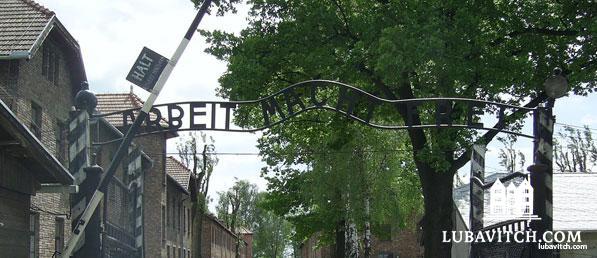(lubavitch.com) Today, Thursday, January 27, marks the 66th anniversary of the liberation of the Auschwitz-Birkenau death camp by Soviet forces. This year record number of visitors–in total some 1.38 million people visited the former death camp. Many also visited Kraków located some 37 miles away. The city is testimony not only to the deaths of the Holocaust victims, but to their lives as well, and today, Kraków’s small Jewish population of 300, represents hope and rebirth.
The city of Kraków – its history and position on Poland’s modern Jewish scene – has become a symbol of the new Polish Jew. Polish youth are attracted to the rich history of the Jewish people in the land that they called home for over a thousand years. Against a backdrop of murder and destruction at the hands of Nazi invaders and their Polish helpers, there has emerged, among a young generation of Jews, a desire to reestablish themselves culturally.
While there has been a Jewish presence in Poland for over a millennium, Jews did not arrive in Kraków, then the nation’s capital, until the late 13th century. Settling in the outlying Kazimierz district, Jewish merchants began to build what would become a center of Jewish scholarship and culture.
As a climate of persecution and expulsions became prevalent in the great Jewish communities of Spain and Germany, Poland became a refuge for many. Those exiled brought skills and knowledge from the West, enriching the Polish commonwealth. By the 16th century, over 80% of world Jewry lived within Poland’s borders.
Rabbi Jacob Pollak, a Bohemian Jew, settled in Kraków in 1503 and introduced the pilpul method of Talmudic study. Still popular today in institutions of Torah study, pilpulic methodology involves the extrapolation of various texts, comparing them to better understand their common underlying factors. In 1550, under the leadership of Rabbi Moses Isserles, a renowned Jewish scholar and commenter on the the Code of Jewish Law, Kraków solidified its status as a center of world Jewish scholarship.
On the eve of the Holocaust, there were 60,000 Jews in Kraków, making up a quarter of the population of the city. By April 1940, all but 15,000 had been expelled. The remaining population, forced into the ghetto, worked in the Płaszów. Conditions in Płaszów were horrible. Slave labor, famines and killings by the sadistic camp commander Amon Göth, put the average survival of camp prisoners to no more than four weeks. The famed German industrialist, Oskar Schindler used his factory to save 1,098 Jews from Płaszów.
Two thousand Jews from Kraków survived the war. Though some Jews opted to stay in Poland, many were nervous. Incidents such as the infamous Kielce pogrom, where 40 Jews returning to their homes and properties were massacred, contributed to the decision not to formally reestablish the Jewish community in Kraków. By 1968, when policy in the Polish government took a decidedly anti-Jewish stance in the wake of the Six Day War, only 700 Jews remained in Kraków.
A new generation, however, has risen in Poland. The grandchildren of survivors and the children of the Communist freeze, were raised fully ignorant of their heritage. Kobi Słomka, 30, was one such Jew. Not until the age of 16, after the passing of his non-Jewish father, did Słomka’s mother tell him of their Jewish heritage. At the time, Słomka admits the revelation was not particularly meaningful. In the wake of collapse of the Soviet Union and Poland’s own communist government, Słomka considered himself a member of “the world at large,” beyond any one particular nationality or group. It was not until a trip to Israel ten years ago that Słomka began to relate to the world as a Jew.
“I suddenly felt a shared commonality with those around me,” Słomka says. “The experience of a broader community that had so much in common with the way I thought was a revelation.”
Słomka returned to Poland, this time settling in Kraków. There among the ruins of a once-great Jewish community, Słomka felt a deep connection to his past. Like other Polish Jews, however, Słomka looks to the future.
“My generation is only beginning to identify as Jewish,” Słomka says. “Hopefully Jewish children born in Poland today will be able to express themselves like the Jews of any other country in the world.”
Rabbi Eliezer and Esther Gurary have served the Jewish community of Kraków and its estimated 500,000 Jewish tourists as the city’s Chabad-Lubavitch emissaries since 2007. They operate a pre-school and kindergarten as well as a kosher restaurant housed in the 350-year-old Isaac’s Synagogue.
“Our goal,” Rabbi Gurary says, “is to help educate those Jewish children in Kraków – to help them reconnect to their heritage and the world Jewish community.”
Gurary points to the positive reception he’s had from the community of Kraków as whole. If anything, the mystique of Kraków’s Jews have sparked renewed interest among Polish youth. The annual Jewish Culture Festival in Kraków drew over 13,000 people to the streets of Kazimierz.
“Today,” says Gurary, “a Jew can walk once more on the street unashamed of his heritage.”

Be the first to write a comment.